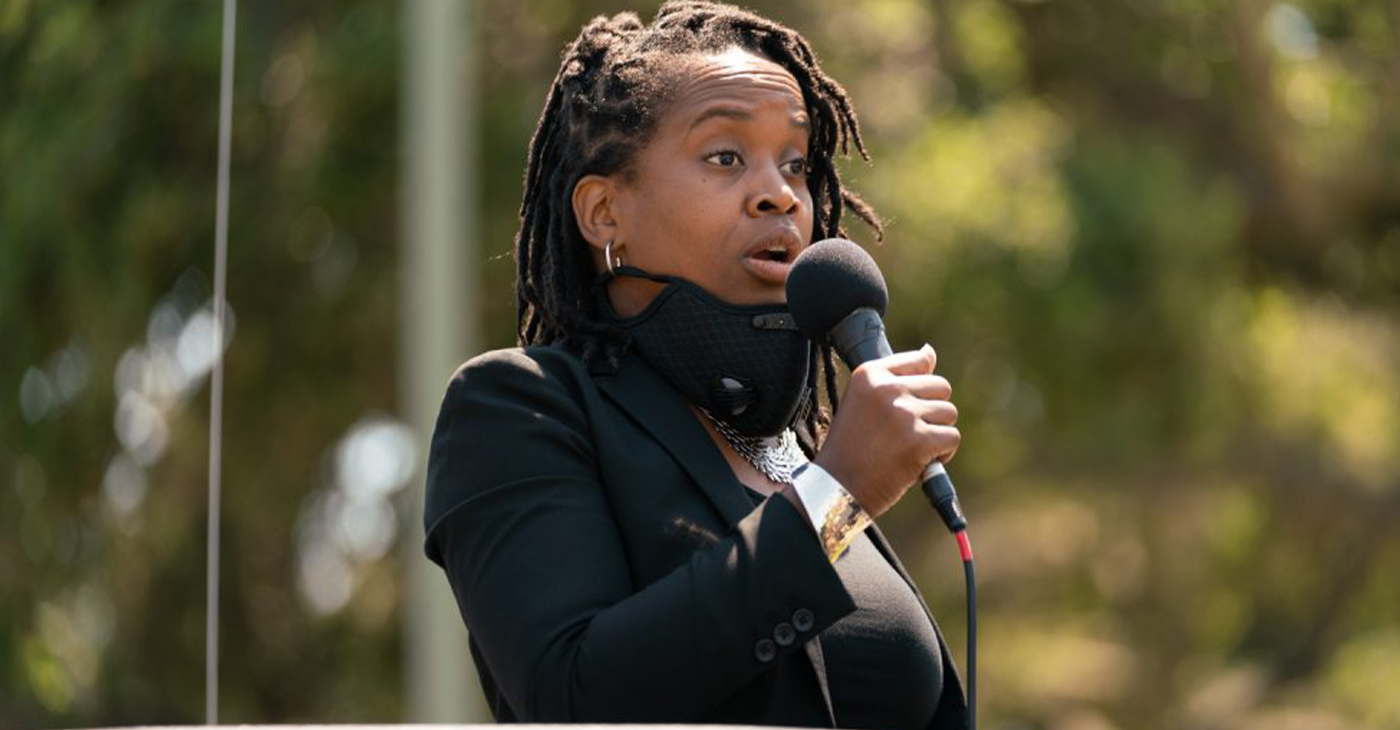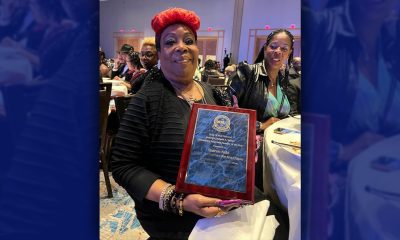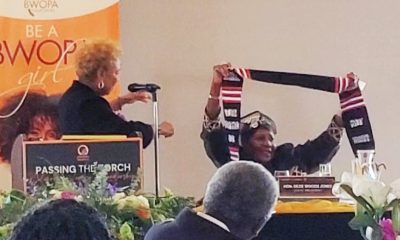City Government
Judge Henderson Will Monitor Investigations of Three OPD Shootings This Year
Federal Judge Thelton Henderson is monitoring how the Oakland Police Department (OPD) is handling the investigations of three officer-involved shootings this year, including the killing this past weekend of Demouria Hogg, 30, of Hayward.
“We will closely monitor the (OPD) investigations and (internal review board) presentations on these incidents,” wrote Compliance Director Robert Warshaw in a report issued June 8 on the progress of police department reforms.

Demouria Hogg, 30, was shot and killed by an Oakland rookie officer on the Lakeshore off-ramp of Highway 580 Saturday, June 5.
Warshaw was appointed by Judge Henderson to oversee Oakland’s efforts to comply with the Negotiated Settlement Agreement (NSA), which requires the city to institute polices and practices that protect the constitutional rights of local residents.
Warshaw noted that prior to these shootings in 2015, OPD had not been involved in an officer-involved shooting for about two years.
Besides the killing of Hogg on Saturday at the Lakeshore off-ramp of Highway 580, two other incidents this year involved “mentally disturbed” suspects.
“In the first case, the officer’s two rounds missed the mentally disturbed subject, who retreated and surrendered; in the second case – which also involved a mentally disturbed suspect whose erratic behavior prompted calls to OPD – the officer’s round struck the subject, who is expected to survive.”
Pointing out a positive development, Warshaw wrote in the report that the department has found it can reduce shootings without reducing policing.
“In the last year, the department has demonstrated reductions in uses of force without reducing the number of arrests or showing any other indications of what is sometimes referred to as ‘depolicing,’” he wrote.
Warshaw is also involved in discussions that are taking place in the wake of the city’s new policy that curtails nighttime protest marches.
“I have commended the department for its more thoughtful and cautious approach to crowd control in the past,” he said. “Recently, however, the city has begun interpreting its crowd control policy more broadly and has appeared to restrict the routes of nighttime marches following several protests that involved looting and serious destruction of public property.”
“I will continue to facilitate discussions between the department and local attorneys,” including representatives of the National Lawyers Guild, he said.
In another major issue, the court has begun to address the failure of city staff, including City Attorney Barbara Parker’s office, to adequately handle cases of officers who have been terminated for serious misconduct, resulting in loss of arbitrations and reinstatement of the officers.
Warshaw cited a recent report by a court-appointed investigator who found that Oakland’s “police discipline process is ‘broken,’ because, among other reasons, it fails to ‘deliver fair, consistent, and effective discipline.’”
The report quoted Judge Henderson, who wrote, “It is difficult to reach any conclusion other than that the city has been indifferent, at best, to whether its disciplinary decisions are upheld at arbitration.”
The report blames these failures on the “lack of accountability” of officials in both OPD and the Office of the City Attorney.
Warshaw commended the City Attorney’s recent involvement in resolving the court’s complaints.
“City Attorney (Parker) has become more engaged in matters relevant to the recent report about discipline and arbitration – as well as developments regarding crowd control policy…We look forward to a measure of collaboration with her and her office.”
In response, Parker said in a statement that she had begun to address the problems in handling police discipline cases even before the court had begun its investigation.
“Before the Court ordered its investigation, I conducted my own internal review of my office’s handling of police arbitration cases when issues came to my attention,” she said.
On Wednesday night, protesters marched without a permit in defiance of Schaaf’s curfew. No police showed up, and no one was arrested.
The mayor’s office told the Post the city’s policy has not changed. The city “has not banned nighttime protests …(or) imposed a curfew. Consistent with our existing policy, we are simply implementing time, place and manner provisions to better protect public safety and prevent vandalism and violence.”
“Marchers on roadways without permits may be subject to citation or arrest.”
An OPD officer who issues permits told the media recently he could not remember ever having issued a permit for a nighttime protest.
“This gives the impression that the mayor and the city attorney are opting to use selective enforcement when it suits their needs,” said Post Publisher Paul Cobb, who intends to sponsor a nighttime march for jobs for the formerly incarcerated and youth – without a permit.
Activism
Oakland Post: Week of December 24 – 30, 2025
The printed Weekly Edition of the Oakland Post: Week of – December 24 – 30, 2025

To enlarge your view of this issue, use the slider, magnifying glass icon or full page icon in the lower right corner of the browser window.
Alameda County
Oakland Council Expands Citywide Security Cameras Despite Major Opposition
In a 7-1 vote in favor of the contract, with only District 3 Councilmember Carroll Fife voting no, the Council agreed to maintain its existing network of 291 cameras and add 40 new “pan-tilt-zoom cameras.”

By Post Staff
The Oakland City Council this week approved a $2.25 million contract with Flock Safety for a mass surveillance network of hundreds of security cameras to track vehicles in the city.
In a 7-1 vote in favor of the contract, with only District 3 Councilmember Carroll Fife voting no, the Council agreed to maintain its existing network of 291 cameras and add 40 new “pan-tilt-zoom cameras.”
In recent weeks hundreds of local residents have spoken against the camera system, raising concerns that data will be shared with immigration authorities and other federal agencies at a time when mass surveillance is growing across the country with little regard for individual rights.
The Flock network, supported by the Oakland Police Department, has the backing of residents and councilmembers who see it as an important tool to protect public safety.
“This system makes the Department more efficient as it allows for information related to disruptive/violent criminal activities to be captured … and allows for precise and focused enforcement,” OPD wrote in its proposal to City Council.
According to OPD, police made 232 arrests using data from Flock cameras between July 2024 and November of this year.
Based on the data, police say they recovered 68 guns, and utilizing the countywide system, they have found 1,100 stolen vehicles.
However, Flock’s cameras cast a wide net. The company’s cameras in Oakland last month captured license plate numbers and other information from about 1.4 million vehicles.
Speaking at Tuesday’s Council meeting, Fife was critical of her colleagues for signing a contract with a company that has been in the national spotlight for sharing data with federal agencies.
Flock’s cameras – which are automated license plate readers – have been used in tracking people who have had abortions, monitoring protesters, and aiding in deportation roundups.
“I don’t know how we get up and have several press conferences talking about how we are supportive of a sanctuary city status but then use a vendor that has been shown to have a direct relationship with (the U.S.) Border Control,” she said. “It doesn’t make sense to me.”
Several councilmembers who voted in favor of the contract said they supported the deal as long as some safeguards were written into the Council’s resolution.
“We’re not aiming for perfection,” said District 1 Councilmember Zac Unger. “This is not Orwellian facial recognition technology — that’s prohibited in Oakland. The road forward here is to add as many amendments as we can.”
Amendments passed by the Council prohibit OPD from sharing camera data with any other agencies for the purpose of “criminalizing reproductive or gender affirming healthcare” or for federal immigration enforcement. California state law also prohibits the sharing of license plate reader data with the federal government, and because Oakland’s sanctuary city status, OPD is not allowed to cooperate with immigration authorities.
A former member of Oakland’s Privacy Advisory Commission has sued OPD, alleging that it has violated its own rules around data sharing.
So far, OPD has shared Flock data with 50 other law enforcement agencies.
Activism
Black Arts Movement Business District Named New Cultural District in California
Located in the heart of District 3, the BAMBD is widely regarded as one of the nation’s most important centers of Black cultural production — a space where artists, entrepreneurs, organizers, and cultural workers have shaped generations of local and national identity. The state’s recognition affirms the district’s historic importance and its future promise.

By Post Staff
Oakland’s Black Arts Movement Business District (BAMBD) has been selected as one of California’s 10 new state-designated Cultural Districts, a distinction awarded by the California Arts Council (CAC), according to a media statement released by Councilmember Carroll Fife.
The BAMBD now joins 23 other districts across the state recognized for their deep cultural legacy, artistic excellence, and contributions to California’s creative economy.
Located in the heart of District 3, the BAMBD is widely regarded as one of the nation’s most important centers of Black cultural production — a space where artists, entrepreneurs, organizers, and cultural workers have shaped generations of local and national identity. The state’s recognition affirms the district’s historic importance and its future promise.
“This designation is a testament to what Black Oakland has built — and what we continue to build when we insist on investing in our own cultural and economic power,” said Fife.
“For years, our community has fought for meaningful recognition and resources for the Black Arts Movement Business District,” she said. “This announcement validates that work and ensures that BAMBD receives the support it needs to grow, thrive, and continue shaping the cultural fabric of California.”
Since taking office, Fife has led and supported multiple initiatives that strengthened the groundwork for this achievement, including:
- Restoring and protecting arts and cultural staffing within the City of Oakland.
- Creating the West Oakland Community Fund to reinvest in historically excluded communities
- Advancing a Black New Deal study to expand economic opportunity for Black Oakland
- Ensuring racial equity impact analyses for development proposals, improving access for Black businesses and Black contractors
- Introduced legislation and budget amendments that formalized, protected, and expanded the BAMBD
“These efforts weren’t abstract,” Fife said. “They were intentional, coordinated, and rooted in a belief that Black arts and Black businesses deserve deep, sustained public investment.”
As part of the Cultural District designation, BAMBD will receive:
- $10,000 over two years
- Dedicated technical assistance
- Statewide marketing and branding support
- Official designation from Jan. 1, 2026, through Dec. 31, 2030
This support will elevate the visibility of BAMBD’s artists, cultural organizations, small businesses, and legacy institutions, while helping attract new investment to the district.
“The BAMBD has always been more than a district,” Fife continued. “This recognition by the State of California gives us another tool in the fight to preserve Black culture, build Black economic power, and protect the families and institutions that make Oakland strong.”
For questions, contact Councilmember Carroll Fife at CFife@oaklandca.gov.
-

 Alameda County4 weeks ago
Alameda County4 weeks agoSeth Curry Makes Impressive Debut with the Golden State Warriors
-

 #NNPA BlackPress4 weeks ago
#NNPA BlackPress4 weeks agoLIHEAP Funds Released After Weeks of Delay as States and the District Rush to Protect Households from the Cold
-

 #NNPA BlackPress4 weeks ago
#NNPA BlackPress4 weeks agoSeven Steps to Help Your Child Build Meaningful Connections
-

 #NNPA BlackPress4 weeks ago
#NNPA BlackPress4 weeks agoSeven Steps to Help Your Child Build Meaningful Connections
-

 #NNPA BlackPress4 weeks ago
#NNPA BlackPress4 weeks agoTeens Reject Today’s News as Trump Intensifies His Assault on the Press
-

 Bay Area2 weeks ago
Bay Area2 weeks agoPost Salon to Discuss Proposal to Bring Costco to Oakland Community meeting to be held at City Hall, Thursday, Dec. 18
-

 #NNPA BlackPress4 weeks ago
#NNPA BlackPress4 weeks agoFBI Report Warns of Fear, Paralysis, And Political Turmoil Under Director Kash Patel
-

 Activism2 weeks ago
Activism2 weeks agoMayor Lee, City Leaders Announce $334 Million Bond Sale for Affordable Housing, Roads, Park Renovations, Libraries and Senior Centers


























































